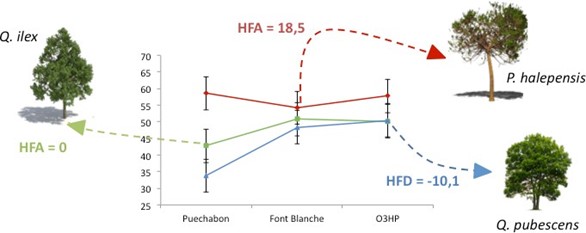Susana Da Silva Pereira (OT-Med PhD student)
Virginie Baldy, Catherine Fernandez (IMBE)
(ECORREV)
(CEREGE)
(CRPF)
This project aims at linking climate change scenarios in the Mediterranean region to biodiversity dynamics across several trophic levels, and quantifying their "feedback" on the functioning of the ecosystems including the regeneration of the pubescent oak. It is based on an experimental approach.
The specific objective is to measure the consequences of an increase of the drought period and its intensity on litter decomposition. This process directly affects the carbon cycle and results are expected to improve predicting tools for climate change effects on ecosystem carbon sequestration, which is a major ecosystem service.
This project evaluates at a regional scale the impact of rainfall changes :
1) directly by measuring litter production and decomposition of Mediterranean Oak forest;
2) indirectly by measuring litter decomposition through changes in litter biochemical composition, particularly the quantity and diversity of plant secondary metabolites and
3) the possible effects on plant community and soil diversity dynamics.
LPJ-GUESS model is used to simulate ecosystem patterns and processes (carbon allocation due to secondary metabolites production and soil biodiversity interactions under climate changes projections). The results of the model simulations are available to forest managers and skateholders in order to lead to concrete actions for the adaptation to climate change and biodiversity conservation of the oak forest in the Provence Region.
Metabolomics and molecular analyses, as well as two in situ experiments, were carried out on litter samples of 4 plant species of the pubescent oak forest growing at O3HP. These measured :
- soil respiration at O3HP monthly for one year;
- soil carbon stocks in the 3 experimental forests.
- abundance of actinobacteria associated with decomposed bedding.



